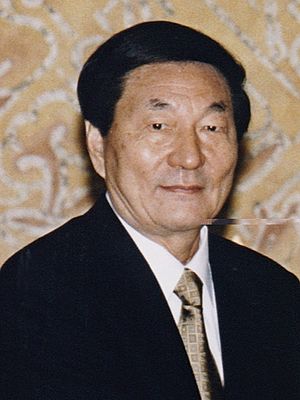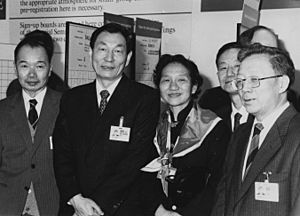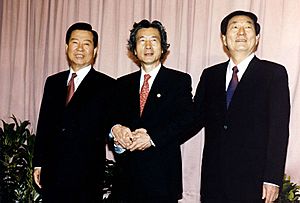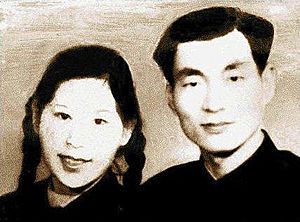Zhu Rongji facts for kids
Quick facts for kids
Zhu Rongji
|
|||||||||||||||||||
|---|---|---|---|---|---|---|---|---|---|---|---|---|---|---|---|---|---|---|---|
| 朱镕基 | |||||||||||||||||||

Zhu in 2000
|
|||||||||||||||||||
| Premier of China | |||||||||||||||||||
| In office 17 March 1998 – 16 March 2003 |
|||||||||||||||||||
| President | Jiang Zemin | ||||||||||||||||||
| Vice Premier | Li Lanqing Qian Qichen Wu Bangguo Wen Jiabao |
||||||||||||||||||
| Preceded by | Li Peng | ||||||||||||||||||
| Succeeded by | Wen Jiabao | ||||||||||||||||||
| First-ranked Vice Premier of China | |||||||||||||||||||
| In office 29 March 1993 – 17 March 1998 |
|||||||||||||||||||
| Premier | Li Peng | ||||||||||||||||||
| Preceded by | Yao Yilin | ||||||||||||||||||
| Succeeded by | Li Lanqing | ||||||||||||||||||
| Governor of the People's Bank of China | |||||||||||||||||||
| In office 2 July 1993 – 30 June 1995 |
|||||||||||||||||||
| Premier | Li Peng | ||||||||||||||||||
| Preceded by | Li Guixian | ||||||||||||||||||
| Succeeded by | Dai Xianglong | ||||||||||||||||||
| Communist Party Secretary of Shanghai | |||||||||||||||||||
| In office 1 August 1989 – 20 March 1991 |
|||||||||||||||||||
| Preceded by | Jiang Zemin | ||||||||||||||||||
| Succeeded by | Wu Bangguo | ||||||||||||||||||
| Mayor of Shanghai | |||||||||||||||||||
| In office 25 April 1988 – 20 March 1991 |
|||||||||||||||||||
| Preceded by | Jiang Zemin | ||||||||||||||||||
| Succeeded by | Huang Ju | ||||||||||||||||||
| Personal details | |||||||||||||||||||
| Born | 23 October 1928 Changsha, Hunan, Republic of China |
||||||||||||||||||
| Political party | Chinese Communist Party (1949–1958; 1978–) | ||||||||||||||||||
| Spouse |
Lao An
(m. 1956) |
||||||||||||||||||
| Children | Zhu Yanlai (daughter) Zhu Yunlai (son) |
||||||||||||||||||
| Alma mater | Tsinghua University (BS) | ||||||||||||||||||
| Profession | Electrical engineer | ||||||||||||||||||
| Chinese name | |||||||||||||||||||
| Simplified Chinese | 朱镕基 | ||||||||||||||||||
| Traditional Chinese | 朱鎔基 | ||||||||||||||||||
|
|||||||||||||||||||
Zhu Rongji (born October 23, 1928) is a retired Chinese politician. He served as the 5th Premier of China from 1998 to 2003. The Premier is like the head of government in China. He was also a member of the Politburo Standing Committee of the Chinese Communist Party, a very important group of leaders, from 1992 to 2002.
Zhu was born in Changsha, Hunan. He joined the Chinese Communist Party (CCP) in 1949, the same year the People's Republic of China was founded. In 1957, he criticized some economic ideas, which led to him being labeled a "rightist." This meant he lost his job and was removed from the Party. He was sent to work in a remote school. He was later allowed to work again in 1962. During the Cultural Revolution, he was sent to a special farm for "re-education."
After 1976, Zhu was allowed to rejoin the CCP. He worked in different government roles, focusing on the economy. In 1988, he became the mayor of Shanghai, a big city in China. There, he started many economic changes. He then became the city's Party secretary in 1989.
Zhu became the Vice Premier of China in 1993, working under Premier Li Peng. He continued to push for economic reforms. In 1998, he became the Premier. Zhu was known for leading China's economic policies. He had a reputation as a tough but practical leader. During his time, China's economy grew very fast. He retired in 2003 and has stayed out of public life since then.
Contents
Early Life and Education
Zhu Rongji was born in Changsha, Hunan, on October 23, 1928. His family was well-educated and owned land. Family stories say his family was related to Zhu Yuanzhang, the first emperor of the Ming dynasty. His father passed away before he was born, and his mother died when he was nine. His uncle, Zhu Xuefang, then raised him and helped him get an education.
Zhu went to school locally and later attended the famous Tsinghua University in Beijing. At Tsinghua, he was a student leader and joined activities with the Communist Party. He earned a degree in electrical engineering. He joined the Chinese Communist Party (CCP) in 1949, the year the People's Republic of China was formed.
Early Career and Challenges
Zhu started his career as a government worker in Northeast China. From 1952 to 1958, he worked in the State Planning Commission. In 1957, during the Hundred Flowers Campaign, he spoke out against some of Mao Zedong's economic ideas. He said they pushed for "too much growth." Because of this, he was labeled a "rightist" in 1958 during the Anti-Rightist Campaign. This meant he was punished, lost his job, and was kicked out of the Communist Party. His family also faced problems, and their home was destroyed.
After this, Zhu was sent to work at a remote school. In 1962, after a big famine, he was allowed to work again as an engineer. But he was not fully cleared of the "rightist" label yet. During the Cultural Revolution, Zhu faced problems again. From 1970 to 1975, he was sent to a special farm called a May Seventh Cadre School. There, he worked as a manual laborer, doing farm work.
After Mao's death in 1976, Deng Xiaoping came to power. He started political changes that helped people who had been punished. From 1976 to 1979, Zhu worked as an engineer in the Ministry of Petroleum Industry. In 1978, he was officially cleared and allowed to rejoin the CCP. In the 1980s, he was promoted to more important jobs. He rose through the government because of his skills, not because of special connections. In 1979, he joined the State Economic Commission, where he became a vice-minister from 1983 to 1987.
After rejoining the government, Zhu reconnected with his old university, Tsinghua. In 1984, he became the first dean of the Tsinghua University School of Economics and Management. He held this position for 17 years. He helped create strong ties between Tsinghua and M.I.T.. He also became known for guiding younger colleagues.

Political Career in Shanghai
In 1988, Zhu became the mayor of Shanghai. Shanghai was China's largest and richest city at the time. As mayor, Zhu made big improvements in things like phones, city buildings, and transportation. This was especially true in Pudong, a special economic zone.
Early in his time as mayor, Zhu gave a speech encouraging businesses to "swim by themselves in the markets." He said everyone could connect through markets. This helped him become known as someone who supported economic freedom.
In Shanghai, he became known for fighting corruption and for being a skilled economic reformer. He made it easier for the government to approve business deals. This earned him the nickname "One-Chop Zhu." He also created a group of foreign business people to get advice. He worked closely with Jiang Zemin, who was then the Party secretary of Shanghai. This partnership continued throughout Zhu's career.
He was also known for following laws strictly and not giving special favors to friends or family. Once, in 1988, when family members asked him to help them move to Shanghai, he refused. He told them, "What I can do, I have done already. What I cannot do, I will never do."
In 1989, when large protests happened across China, Shanghai also had protests. Unlike in Beijing, Zhu was able to solve the situation peacefully in Shanghai. While some protesters caused damage, Zhu managed to keep public support. He said that solving the problems in Beijing helped Shanghai remain peaceful.
After the protests, Zhu was promoted to be the Communist Party secretary of Shanghai in 1989. He also helped Deng Xiaoping regain his influence by helping organize Deng's 1992 Southern Tour.
In 1990, Zhu led a group of Chinese mayors to the United States. They met with American leaders and business people. This was the first high-level group from China to visit the U.S. after the 1989 protests. Zhu met important figures like Richard Nixon and Henry Kissinger. He gave speeches in Chinese and English without a script. American journalists and leaders praised him for being open and energetic.
Zhu wanted to make big legal and economic changes. He also wanted to make the Chinese government more efficient. However, he made it clear that he did not support major political changes. During his 1990 trip to the U.S., he said, "You have your system of democracy, and we have our system of democracy. But that does not mean we have nothing in common." When asked if he was China's Mikhail Gorbachev, he replied, "No, I am China's Zhu Rongji."
Vice Premiership
Economic Leadership
In 1991, Zhu was promoted to the central government in Beijing. This was largely because of his success in Shanghai. He became the vice premier of the State Council under Premier Li Peng. He also served as the governor of the People's Bank of China (China's central bank) from 1993 to 1995. His first tasks in Beijing included fixing debts of state-owned businesses and making it easier for farmers to sell their grain. Zhu was able to make big reforms because he had strong support from Deng Xiaoping. Deng said Zhu "has his own views, dares to make decisions, and knows economics."
In 1992, when there was a global economic slowdown, China faced problems like too much investment and high inflation. As head of the central bank and vice-premier, Zhu worked to fix these issues. He limited the money supply, cut interest rates, and changed the tax system. He also invested government money in transportation, farming, and energy. He tried to reform state banks to make them more efficient. Because of Zhu's actions, China's economy stayed stable and grew steadily. His success led to him joining the Politburo Standing Committee of the Chinese Communist Party in 1992.
In July 1993, Zhu explained his ideas for China's financial system. He said the country needed a system of financial institutions overseen by the central bank. This system would include national policy banks and state-owned commercial banks. Many of the financial institutions he imagined in 1993 are now very powerful in China and globally.
Premier Li Peng was often against Zhu's economic reform plans. They disagreed in Zhu's first two years as vice-premier. However, Zhu's reforms quickly gained support within the government.
Contributions to China's Economy
Zhu believed in markets but also thought the government had an important role in guiding them. He was not a fan of the government planning the entire economy. He often argued for using indirect economic tools, like controlling interest rates, rather than direct orders.
Zhu and Deng Xiaoping wanted China to have fast and continuous economic growth. Zhu believed two main goals were needed for this. First, he wanted to make the tax and financial system more organized and controlled by the central government. Second, he aimed to make the state-owned businesses stronger and more efficient.
Zhu's first big task was to get central control over the country's growing tax money. He visited each province to explain a new "tax sharing" idea, similar to the U.S. federal tax system. Under this plan, tax money from provinces would first go to Beijing, and then parts would be sent back to the provinces. After this system started, the central government's share of total income increased by over 20% in one year. This helped balance the central budget. To manage China's money, he made himself governor of the People's Bank of China. This brought the banking system more under Beijing's control.
Zhu then dealt with China's four huge state-owned banks. These banks had given out many loans that were not being paid back. He separated these bad loans into new "asset-management companies." He also put more government money into the banks. After becoming premier in 1998, Zhu saved the biggest state-owned businesses. He allowed thousands of smaller ones to close, hoping that new private businesses would create jobs. This meant millions of workers lost their "iron rice bowl" – their guaranteed jobs, health care, and pensions for life. Zhu pushed managers to pay based on performance and make profitability important for promotions in surviving state-owned businesses.
In 1994, Zhu got rid of Foreign Exchange Certificates. These were special money used by foreigners in China.
All these economic changes by Zhu did not get rid of state-owned businesses. Instead, they made them more efficient. Zhu's reforms helped China become richer and more powerful while keeping the Communist Party in control. Zhu also played a key role in reducing inflation.
Premiership
Economic Growth and Reforms
Zhu was chosen to be China's fifth premier in March 1998. This was mainly because he had been so successful in managing big economic projects. As premier, he continued to focus on economic development. He generally supported steady, long-term growth with strong government control over the economy and careful money policies. He kept promoting investment in China's industries and farms.
Early in his term, he started a program to privatize businesses. This lasted throughout his time in office, and China's private sector grew very quickly. He responded to the 1997 Asian financial crisis by making the government smaller. He also kept strict controls on money moving in and out of the country. He funded huge construction projects. During the crisis, he refused to lower the value of the Chinese currency, the yuan. After the crisis, Zhu suggested improving international financial markets to prevent harmful speculation.
Zhu started the China Development Forum in 2000. This meeting brought together Chinese leaders and foreign experts. Zhu saw it as a way to challenge officials and encourage discussions with experts.
He successfully cut the size of the government by half by 2003. However, government offices in areas far from the capital continued to grow. His reform of state-owned businesses led to about 40 million workers losing their jobs over five years. Zhu also introduced limited reforms to China's housing system. For the first time, people could own their own apartments at lower prices.
By the end of Zhu's time as premier, China's economy was stable and growing strongly. While foreign investment worldwide dropped in 2000, money flowing into mainland China increased by 10%. In 2002, foreign investment in China rose by 22.6%. While global trade slowed, mainland China's trade jumped by 18% in the first nine months of 2002. He met with South Korean President Kim Dae-jung and Lee Hee-ho in 2001.
Fighting Corruption
Zhu earned a reputation as a strong and strict leader. He did not tolerate corruption, favoritism, or incompetence. In Beijing, he was sometimes called "Madman Zhu" or "Boss Zhu" because he worked hard and was very open. He also tried to make the Chinese government more transparent. He increased the power of independent groups that oversee the government. He also made the government smaller and opened up jobs to outside experts. He worked to improve the system for hiring and promoting people based on their skills.
Before Zhu, getting a job in the government often depended on how long you had worked there or who you knew. Zhu tried to modernize this system. He opened up senior and mid-level jobs to public selection. He also improved the government's exam system. He worked hard to bring economists and experts from universities and private companies to advise him. This helped ensure that government workers promoted during his time supported his ideas.
During his time as premier, Zhu often launched big efforts to fight corruption. It was reported that he read 16,000 letters a year from citizens. This helped him understand the lives of ordinary Chinese people. He often visited places outside Beijing to check working conditions. In 1998, he made the People's Liberation Army (China's military) give up its businesses. These businesses had been making high-ranking officers and their children rich. Later, he also stopped government workers from being involved in businesses. He tried to put in place stricter rules to stop provincial leaders from taking bribes or stealing government money.
Zhu's investigations found many large cases of wrongdoing by provincial officials. For example, he found that 25.8 billion RMB (Chinese money) meant for buying grain had gone missing. An investigation found that at least 10 billion RMB had been used to build hotels and luxury apartments. In 2001, Zhu uncovered the largest corruption case in modern Chinese history. Many top officials in Fujian province were involved in a huge smuggling operation. Many Party leaders and governors were arrested and executed. Speaking about his efforts to fight corruption, he once said, "I will prepare 100 coffins for the corrupt, and one for me, for I will die of fatigue." Many of his efforts to increase the role of the private market and improve legal protection for businesses were aimed at reducing corruption.
He led the talks for China to join the World Trade Organization (WTO). China joined in 2001, which was praised both in China and internationally. Joining the WTO brought more foreign investment to China. It also required China to follow international rules for trade and other areas. Zhu hoped joining the WTO would lead to economic growth. He also hoped it would force changes within China that he could not make on his own.
Zhu, along with his successor Wen, tried to limit the power of local officials to charge various fees. This was to protect farmers from unfair taxes by corrupt officials.
After Retirement
Zhu retired from his position in the CCP Politburo Standing Committee in November 2002. He retired as premier in March 2003, and Wen Jiabao took his place. After retiring, Zhu stayed out of Chinese politics. However, he kept ties with Tsinghua University, visiting often for ceremonies. In 2014, he wrote a rare public letter for the 30th anniversary of the Tsinghua School of Economics and Management. He encouraged students to visit poor areas of China to understand the lives of most Chinese people.
He appeared at the funeral of Huang Ju on June 5, 2007.
Since leaving office, Zhu has written and been the subject of many books. His first book, Zhu Rongji Meets the Press, was released in 2009. It was a collection of his speeches and interviews. A second book, Zhu Rongji's Answers to Journalists' Questions, was released in 2011. By the end of 2013, over six million copies of his books had been sold. Henry Kissinger wrote that the English translation of his books helped improve relations between China and the U.S. One book about Zhu suggested that leaders in other developing countries should study his reforms. His daughter has said he is not interested in writing a memoir.
After retiring, Zhu put a lot of his time and energy into helping others. In 2013 and 2014, he donated 40 million RMB (about $6.5 million US) to charity. This money reportedly came from the sales of his books. It was given to a charity that promotes education in poor rural areas. This amount of money was unusual for a retired Chinese politician. Some people compared his character to that of China's first premier, Zhou Enlai.
Personal Life
Zhu Rongji is known as a good public speaker. He was also known for speaking English very well. He often gave speeches without a script, and people found them entertaining.
He enjoys reading and has spent much of his retirement reading books he did not have time for while in office. He plays the erhu, a Chinese instrument like a two-stringed violin. He also enjoys Peking Opera and once acted in a performance.
His wife, Lao An, was once a vice-chairman on the board of China International Engineering and Consulting. She and Zhu went to two schools together: Hunan First Provincial Middle School and Tsinghua University. They have two children, a son and a daughter. Their son, Zhu Yunlai, was born in 1957. He was once the president of a successful investment bank. Their daughter, Zhu Yanlai, was born in 1956. She is currently an assistant chief executive for the Bank of China (Hong Kong). She also holds a seat in the National Committee of the Chinese People's Political Consultative Conference.
Legacy

Zhu's time as premier, especially his free-market reforms, was a topic of discussion. Before he retired, Zhu said he had not been able to finish all his desired reforms. In 2003, he gave a speech outlining the "difficulties and problems" he expected his successor, Wen Jiabao, to face. After Zhu retired, Wen tried to continue many of Zhu's reforms. However, some of Zhu's reforms were changed or not fully put into action under the next leaders. For example, state-owned businesses were allowed to grow again and remain important in the Chinese economy. Also, large parts of the banking sector remained unregulated.
Among international leaders, Zhu was known for his intelligence, energy, and impatience with incompetence. Journalists noted his good English and his sense of humor. By the time he retired, Zhu was more popular than his predecessor, Li Peng, both in China and abroad. Economists noted that he was much better at managing the economy than Li Peng.
Zhu was well known for trying to fight corruption, but he could not stop it completely during his term. After 2012, one of Zhu's close associates, Wang Qishan, became the head of the CCP's main group for investigating corruption. Zhu publicly supported Xi Jinping's anti-corruption campaign. Zhu did not appear at the 70th anniversary of the PRC in 2019 or the 100th anniversary of the CCP in 2021. He celebrated his 92nd birthday in October 2020 during the COVID-19 pandemic.
See also
 In Spanish: Zhu Rongji para niños
In Spanish: Zhu Rongji para niños
- History of the People's Republic of China (1989–2002)
- Macroeconomic regulation and control
- Politics of China
 | Leon Lynch |
 | Milton P. Webster |
 | Ferdinand Smith |


